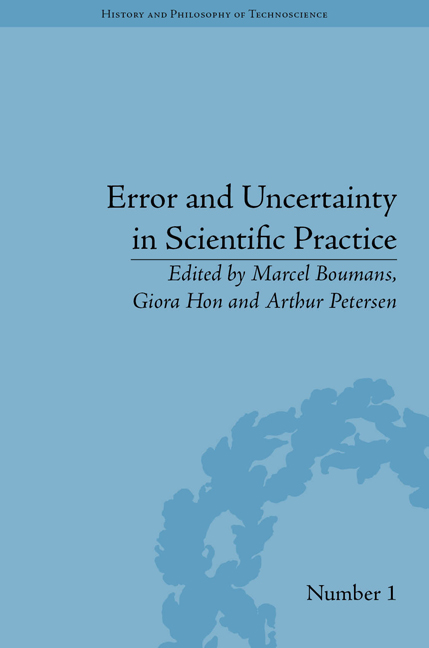Book contents
- Frontmatter
- Contents
- Acknowledgements
- List of Contributors
- List of Figures and Tables
- Introduction
- 1 The Lack of a Satisfactory Conceptualization of the Notion of Error in the Historiography of Science: Two Main Approaches and Shortcomings
- 2 Experimental Knowledge in the Face of Theoretical Error
- 3 Learning from Error: How Experiment Gets a Life (of its Own)
- 4 Modelling Measurement: Error and Uncertainty
- 5 Handling Uncertainty in Environmental Models at the Science–Policy–Society Interfaces
- 6 Variations on Reliability: Connecting Climate Predictions to Climate Policy
- 7 Order and Indeterminism: An Info-Gap Perspective
- 8 Learning from Data: The Role of Error in Statistical Modelling and Inference
- Notes
- Index
2 - Experimental Knowledge in the Face of Theoretical Error
- Frontmatter
- Contents
- Acknowledgements
- List of Contributors
- List of Figures and Tables
- Introduction
- 1 The Lack of a Satisfactory Conceptualization of the Notion of Error in the Historiography of Science: Two Main Approaches and Shortcomings
- 2 Experimental Knowledge in the Face of Theoretical Error
- 3 Learning from Error: How Experiment Gets a Life (of its Own)
- 4 Modelling Measurement: Error and Uncertainty
- 5 Handling Uncertainty in Environmental Models at the Science–Policy–Society Interfaces
- 6 Variations on Reliability: Connecting Climate Predictions to Climate Policy
- 7 Order and Indeterminism: An Info-Gap Perspective
- 8 Learning from Data: The Role of Error in Statistical Modelling and Inference
- Notes
- Index
Summary
Introduction
Much of the advancement of scientific knowledge is due to or consists of advances in experimental knowledge. Such experimental progress, moreover, owes a great deal to advances in our understanding of how to systematize, quantify and eliminate error. It is therefore no surprise that the turn by philosophers of science toward error as a subject of interest in its own right is strongly associated with their turn toward experiment, beginning with the ‘New Experimentalists’ in the 1980s. Much of the work that characterized the New Experimentalism in philosophy of science emphasized the idea that, in Hacking's words, ‘experimentation has a life of its own’, a slogan that could be interpreted differently depending on whether one wished to emphasize the continuity of experimental methods across radical changes in theory, the possible independence of experimental evidence from theoretical assumptions, or the growth of knowledge at the experimental rather than the theoretical level as the driver of scientific advancement.
It was perhaps inevitable that there would be some backlash against this emphasis on the independence of experiment from theory. Even authors who contributed to the turn toward experiment began to point out the important role played by theoretical assumptions in arriving at experimental results.
- Type
- Chapter
- Information
- Error and Uncertainty in Scientific Practice , pp. 39 - 56Publisher: Pickering & ChattoFirst published in: 2014



